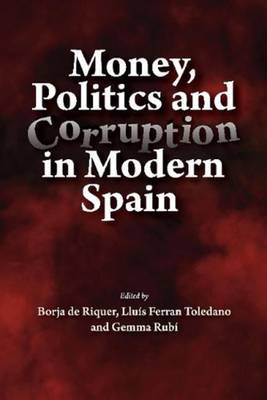
- Retrait en 2 heures
- Assortiment impressionnant
- Paiement sécurisé
- Toujours un magasin près de chez vous
- Retrait gratuit dans votre magasin Club
- 7.000.0000 titres dans notre catalogue
- Payer en toute sécurité
- Toujours un magasin près de chez vous
Money, Politics and Corruption in Modern Spain
271,45 €
+ 542 points
Description
It is common to think that Latin countries, in southern Europe or Latin America, are naturally corrupt regions when, in reality, this is a modern-day cliche that merely legitimises alleged superiority. This book provides the interpretative tools to investigate political corruption in contemporary Spain and its colonies, in a comparative and interdisciplinary historical perspective, conducted and developed by specialists in economic history, political and administrative history, and political science. Addressing the historical functionality of corruption in Spain, and its weakening of the democratic ideal, provides an investigatory template and research model for combating and better understanding the evolution of corruption in Western democracies and other international arenas. Key to the investigation are the interrelations established between political power bases and different economic interest groups, against the background of elites who have become state players over time. The most frequent corrupt practices are bribery, favouritism, tax fraud, embezzlement of public funds, revolving appointment doors, influence peddling and political control of local territories through electoral corruption (caciquismo). Discussion centres on preventative measures to combat such practices. These behaviours exist historically both in continental Europe and in Great Britain, but with notable differences regarding the impunity of crimes, the lack of division of administrative and political oversight, and the absence of a culture of accountability. Chapter contributions explain the impact and circumstances of corruption in business, the economy, and national and local administrations. The work covers a wide historical range, including the imperial penetration of corruption in Restoration Bourbon Spain; hunger and bribery under the Franco regime; and the consequences of the financial crisis of 2008. Published in association with the Canada Blanch Centre for Contemporary Spanish Studies.
Spécifications
Parties prenantes
- Editeur:
Contenu
- Nombre de pages :
- 240
- Langue:
- Anglais
- Collection :
Caractéristiques
- EAN:
- 9781789760705
- Date de parution :
- 01-04-21
- Format:
- Livre relié
- Format numérique:
- Genaaid
- Dimensions :
- 159 mm x 230 mm
- Poids :
- 435 g

Seulement chez Librairie Club
+ 542 points sur votre carte client de Librairie Club
Les avis
Nous publions uniquement les avis qui respectent les conditions requises. Consultez nos conditions pour les avis.




